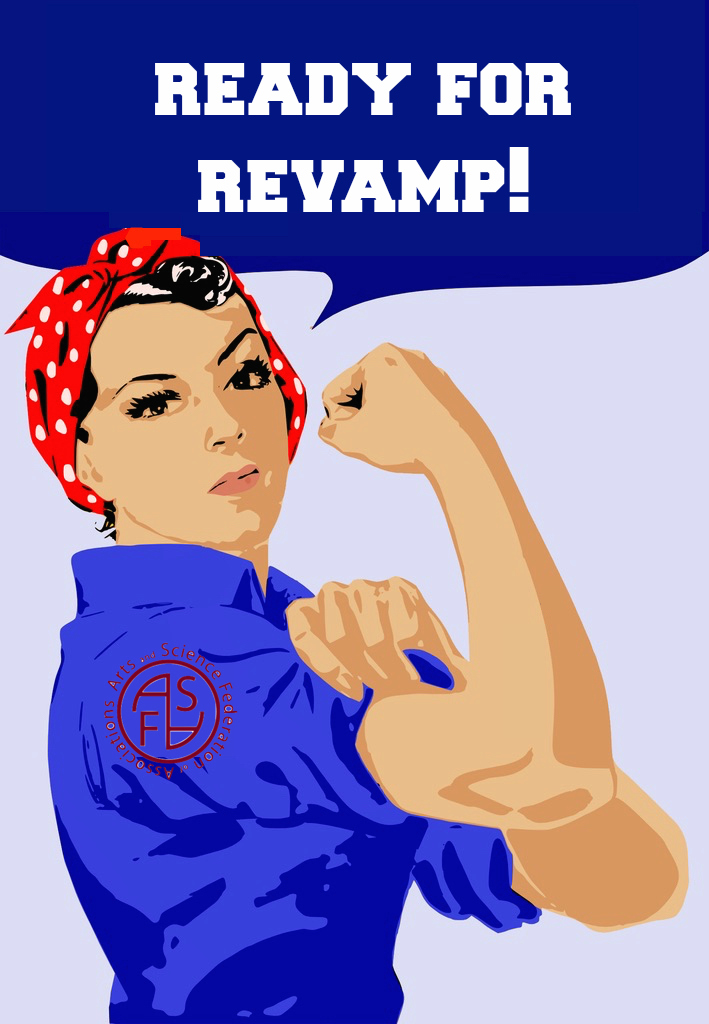ASFA executives weigh in on critiques they received and motivation for the association’s future
As ASFA executives roll out for another semester, The Concordian sat down with a portion of the team to learn about their future plans for the upcoming semester, their inability to reach quorum in December and their response to the criticism the association has received in the past.
Talk of reforming ASFA
In April 2016, ASFA held a vote with the referendum question of whether the federation should be restructured or not, which was ultimately rejected. Executives weighed in on revisiting the vote.
“Before you reform ASFA as a whole, you should try to fix what’s already there and do your best for it to be representative of the goals that ASFA has,” said ASFA vice-president of internal affairs, Julia Sutera Sardo.
“There are some issues that were found in the by-laws,” said Sutera Sardo. By-laws are currently under adjustment. The policy review committee, a committee responsible for reviewing policies to ensure they are proper, has been very focused on updating by-laws and ensuring that they are accurate, said Sutera Sardo.
“The problem with the reform proposal last year is that it was very poorly made,” said Agunik Mamikonyan, ASFA’s vice-president of external affairs and sustainability and a former School of Community and Public Affairs councillor. “I would say the team wasn’t as driven to make ASFA rise again and become what it used to be.”
We have had to deal with a lot of things this semester,” said Sutera Sardo, referring in part to the executive team’s revision of improperly passed standing regulation, including last year’s reform policy. The policy was meant to restructure the federation but was ultimately rejected in April.
Reflecting on ASFA not reaching quorum in December
From Nov. 28 to 30, ASFA held a vote at both campuses to increase ASFA’s levy fee by $0.12—from $1.22 to $1.34 as of January 2017. However, the vote failed to reach the minimum of 517 votes required to validate the vote.
“Just because quorum wasn’t reached does not mean ASFA is not present,” said Mamikonyan. It does not mean ASFA is not doing well, she said, it just means people may be satisfied enough not to feel a need to vote.
“We had 20 out of 32 member associations conduct elections during the by-election period,” said Sutera Sardo. She added it was a hectic time, which may have had an impact on people coming out to vote for ASFA.
“One of the reasons we wanted to increase levy fees was to give some more money to member associations,” said Sutera Sardo. This would help member associations (MAs) do new things and try to engage their own memberships, she said.
ASFA is not giving up on engaging MAs as a whole, said Sutera Sardo, adding that executives have been organizing events to connect MAs with one another, including a recently-announced wine and cheese for MAs in February.
Accepting the past and moving forward
Executives responded to criticisms made to ASFA by student-media and other sources.
“ASFA from [2014] is not the same as 2016 ASFA. We’ve changed and the Mei Ling affair is part of ASFA’s past,” said Sutera Sardo. “We’re not silent about it and we’re trying really hard to work to stop any oppression that’s happening.”
ASFA passed an anti-racist position motion during council on Jan. 12. The motion states that the association should recognize the impact discrimination, systemic racism and colonialism has on black and indigenous people and people of colour and to be an ally to them.
“We just want to enrich student life on campus and protect the rights of our students,” said Sutera Sardo. This semester, ASFA will be releasing an academic journal, which will give arts and sciences students a chance to publish academic work. Additionally, Sutera Sardo said there will also be an anti-racism and appropriation of indigenous cultures workshop, a queer and sexuality conference and a sustainability fair held by ASFA. They will also be purchasing feminine hygiene products which will be readily available and free at MA offices in weeks, said Sutera Sardo.
ASFA president, Andrea Krasznai, aims to ensure proper organization for the future, by creating an executive guide to help incoming executives feel supported. It will include valuable tips and information, such as a list of ASFA computer passwords or how to register a student organization. There are issues like this that pop up during an executive’s mandate that could have easily been avoided had this information been passed on directly, said Krasznai.
Commenting on critique
ASFA has undergone criticism regarding the federation being useless or indirect. Some of the executive team provided a response to these critiques.
Krasznai said she disagrees with statements pertaining to ASFA being unuseful. “The question at the end of the article, “What is the point of ASFA”—I said it in my campaign,” said Krasznai, referring to an article The Link published in 2016. It questioned ASFA’s relevance, referencing the history of the association failing to reach quorum.
ASFA’s goal is to provide academic and social enrichment, said Krasznai. ASFA provides grounds for connecting students socially and directing students to academic resources students may not know about, she added. Some of these resources can be knowledge of bursaries Concordia offers, which Krasznai said the university is failing to properly advertise to students.
Krasznai said a goal within her mandate as general coordinator is to put all of the bursaries on the ASFA website. Krasznai only found out about bursaries during her third year.
Referring to the same article, Mamikonyan said ASFA was critiqued on not having a clear vision. “That’s why it’s so wonderful,” she said. “There’s such diversity within [ASFA] that there’s different opinions coming together.” She said she sits on many boards that don’t have a variety of opinions. “Everyone’s expressing the same opinion and that’s not the point of board members.”
